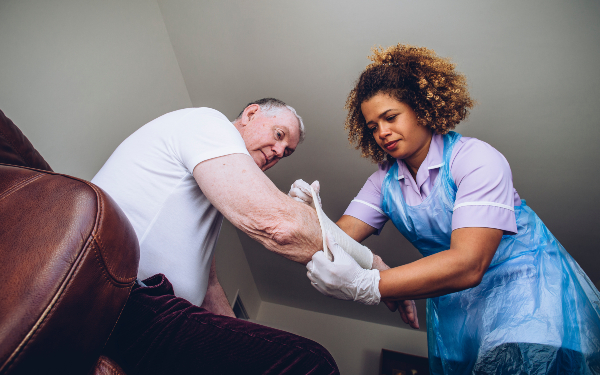
There is a £1.6bn gap between council home care fees and the minimum price required by providers in England to operate sustainably, the Homecare Association has found.
Local authorities met just over half of the additional costs faced by English providers in 2025-26 in fee rises, according to the provider body’s latest analysis of the sector’s financial position, published today.
Providers have faced significant cost increases since April 2025, due to a rise, from £11.44 to £12.21 per hour, in the national living wage (NLW), driving equivalent pay increases for many thousands of care staff, and a hike in employers’ national insurance contributions (NICs). The NICs rate rose from 13.8% to 15% of pay and the salary threshold at which employers start paying the tax fell from £9,100 to £5,000 in April.
Fee rises covering just over half of providers’ extra costs
As a result, home care providers faced a 10% increase in costs in 2025-26, according to the Homecare Association.
However, it found English councils had increased fees by just 5.6% on average, based on an analysis of contract information covering 90% of authorities. Just two increased fees by 10%, it reported.
On average, councils are paying providers £24.10 an hour, just 75% of the Homecare Association’s calculation of the minimum price required by providers, which was £32.14 an hour for 2025-26.
This is based on organisations being funded to pay care workers the NLW, resource management and supervisor salaries, meet other costs, such as recruitment, training, rent, utilities, legal fees and overheads, and make a profit of 7%, which the Homecare Association described as “small”.
£1.6bn funding shortfall
As a result, there was a shortfall in funding of £1.6bn in England, said the association.
The gap was greatest in London, where average fees were £22.10 per hour, below the Homecare Association’s assessment of the costs for providers of employing care workers on the NLW alone, which was £22.71. The best-paying region was the South West, but at £25.94 an hour, this was still over £6 per hour less than the provider body’s overall minimum price.
The findings reflect longstanding claims by provider and local government leaders that the sector has not been sufficiently funded to meet the additional costs it is facing this year.
Think-tank the Nuffield Trust has calculated that the NLW and NICs rises will cost independent care providers in England an extra £2.8bn in 2025-26, with councils, on paper, required to meet £2bn of this as they purchase about 70% of the care provided by these services.
But while the government has claimed that English councils with adult social care responsibilities will have up to an additional £3.7bn in budget in 2025-26, approximately £1.2bn of this is dedicated to adult social care.
End to international recruitment of care staff
The news also comes with provisional Skills for Care data showing a vacancy rate of 9.4% in home care in England as of March 2025.
Though this has fallen by 2.5 percentage points since March 2024, the sector is facing a squeeze on labour supply due to the government’s decision to end international recruitment of overseas staff later this year.
The government plans to make working in the sector more attractive for UK workers by creating a fair pay agreement, under which an Adult Social Care Negotiating Body will set pay and conditions for services in England, subject to ministerial approval. However, there is no date for its implementation, nor any additional funding allocated to it currently.
The Homecare Association’s report comes ahead of the government’s spending review next week, which will set public expenditure limits from 2026-29, including for local government.
The association called for an immediate injection of at least £1.6bn into home care services, a national care contract to guarantee “sustainable, lawful fee rates” and a commitment to fully fund the fair pay agreement.
Spending review ‘must mark turning point for social care’
“Failure to support us all to live well at home has far-reaching consequences. Ambulance queues, corridor care, burgeoning waiting lists for assessment and treatment, unnecessary suffering and death, and economic inactivity,” said the association’s chief executive, Jane Townson.
“The spending review must mark a turning point. This time, the government cannot plead ignorance. The evidence is here. The need is urgent. Ministers must match their words with action or stand accused of knowingly perpetuating exploitation and neglect.”
The Association of Directors of Adult Social Services (ADASS) issued a similar call, saying the government needed to “take account of the urgent need to properly fund adult social care and build a system that works for everyone” in the spending review.
Its president, Jess McGregor, said: “While it’s good the national living wage has increased wages for low paid workers, the government has failed to provide additional funding for social care to fully cover the rising wage bills and costs to providers of employer national insurance, pushing further financial burden onto local authorities and providers.”
Casey Commission ‘to recommend system fair and affordable to all’
A government spokesperson said: “This government has provided a funding boost of up to £3.7bn for social care authorities in 2025-26, which includes a £880 million increase in the social care grant [which can be spent on children’s, as well as adults’ services]. The government is also introducing the first ever fair pay agreement so care professionals are recognised and rewarded for the vital work that they do.”
The spokesperson also pointed to the work of the Independent Commission into Adult Social Care, headed by crossbench peer and renowned government troubleshooter Baroness (Louise) Casey, which started its work in late April.
They said that the commission would “provide recommendations for a social care system that is fair and affordable for all”.







 Bournemouth, Christchurch and Poole
Bournemouth, Christchurch and Poole  Hampshire County Council
Hampshire County Council  Oxfordshire County Council
Oxfordshire County Council  South Gloucestershire Council
South Gloucestershire Council  Wokingham Borough Council
Wokingham Borough Council  The highs and lows of a children’s services’ transformation journey
The highs and lows of a children’s services’ transformation journey  Embedding learning in social work teams through a multi-agency approach
Embedding learning in social work teams through a multi-agency approach  The family safeguarding approach: 5 years on
The family safeguarding approach: 5 years on  Harnessing social work values to shape your career pathway
Harnessing social work values to shape your career pathway  Workforce Insights – showcasing a selection of the sector’s top recruiters
Workforce Insights – showcasing a selection of the sector’s top recruiters  Free CPD on Parkinson’s for health and social care staff
Free CPD on Parkinson’s for health and social care staff 

 Facebook
Facebook X
X LinkedIn
LinkedIn Instagram
Instagram
No comments yet.